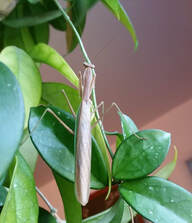 A mantis from UMD’s insect zoo at Todd Water’s apartment during lockdown (Photo credit: Todd Waters) A mantis from UMD’s insect zoo at Todd Water’s apartment during lockdown (Photo credit: Todd Waters) Written by: Maria Cramer, PhD student, Hamby Lab Seven months into the global COVID-19 pandemic, Dr. Leslie Pick, department head of entomology, kicked off the department’s fall colloquium series in a way that’s become familiar; she muted the audience, thanked everyone for coming, and shared her screen. Past colloquium speakers have talked about the latest research in entomology, but Dr. Pick talked about topics even more important: COVID-19 and racism. Addressing COVID, she took us back to March by reminding us that over a one-week period the department transitioned from normal research to working from home with severe research restrictions. When you’re working with live animals and cultures, however, this doesn’t mean hitting a pause button. The whole department mobilized to care for colonies of insects and live cultures on campus or bring them home. Bringing home wolf spiders, lady beetles, and mantises was a new adventure for many and even attracted the attention of Nature and NPR.  Protests over police murders of Black people led by UMD students in June 2020. (Photo credit: Julia Nickhinson/The Diamondback) Protests over police murders of Black people led by UMD students in June 2020. (Photo credit: Julia Nickhinson/The Diamondback) Dr. Pick also emphasized that safety has always been a top priority, so throughout the lockdown only a handful of department members could come in. Then the department transitioned to a gradual reopening phase, allowing limited numbers of researchers into labs to continue important research projects, but with extensive safety practices in place. These include one-way flow of traffic through the building, reduced occupancy in labs, compulsory mask-wearing, and constant sanitation. The meticulous lab practices that lead to successful lab research have been good training for COVID safety precautions. The level of sanitation in the entomology department would also not be possible without our housekeeping staff who have worked throughout the pandemic. Dr. Pick described how our department has continued the tri-partite mission of the University of Maryland (teaching, extension, and research) despite COVID restrictions. Many faculty members have transitioned to excellent on-line teaching, reimagining old courses and developing new ones, as well as virtual outreach like Anahí Espíndola’s pollinator blog posts and Sara Via’s free climate change webinars. Research continued, with department members conducting research, publishing, and receiving grants. Dr. Pick emphasized that all of these achievements were particularly impressive given the impacts that COVID has had on our ability to work. Racism in the United States is even more widespread and damaging than COVID-19. Following years of police violence against Black Americans, the police murder of George Floyd in May sparked protests across the country addressing anti-Black racism. Dr. Pick talked about how The University of Maryland entomology department was affected. She highlighted the personal work many of us have been doing; private soul-searching, self-education to examine internalized racism and work to be anti-racist, participating in protests and discussion groups, and financially supporting anti-racist organizations. Beyond these individual actions, the department is evaluating its own success in fostering diversity and inclusion. A working group of staff, students, and faculty led by Dr. Dan Gruner is critically evaluating the department and preparing proposals for changes that need to be made. At the campus-wide level, UMD’s new president Darryll J. Pines instituted requirements that each department develop onboarding that includes anti-racism training. An ongoing series of anti-racism teach-ins has been put together by Dr. Carlton Green. Dr. Pick also emphasized that as scientists we have important roles as teachers. In this capacity we have the ability to and must speak out against pseudoscientific racism. Historically, scientific research on humans has included such racist beliefs and practices as eugenics and experimentation without consent. She reminded us that although we may not think it needs to be said, it still must be stated that there is no biological basis for race, and that race is a social construct. A 2016 paper in Science argues for the need to reevaluate racial categories in human genetic research, largely because they are socially constructed and ambiguous. The paper points to W. E. B DuBois’ insight many years ago that disparities in health outcomes between white and Black people come from social inequality. In “Signaling Inclusivity in Undergraduate Biology Courses through Deliberate Framing of Genetics Topics Relevant to Gender Identity, Disability, and Race” Karen Hales (2020) outlines ways that changing language and content in genetics and biology classrooms can combat racism and signal inclusivity. These are steps that each of us can take to make an inclusive learning environment. It’s vital for us to have a clear understanding of the history and current status of racism in scientific research and explicitly teach the truth at every opportunity. Dr. Pick modeled this with her forthright evaluation of where we stand as a department and her call to action. While COVID-19 has slowed important research in our department and the urgency of fighting racism has introduced new needs for education and action, overcoming these challenges and making a safe, anti-racist world is a key part our work. Dr. Pick’s “state of the department” colloquium talk gave us support to do this as we go into the school year ahead. Further reading: Knowing our History: African American Slavery and the History of the University of Maryland. By the students of History 409. 2009. Taking race out of human genetics. Yudell, Roberts, DeSalle & Tishkoff (2016). Science. Signaling Inclusivity in Undergraduate Biology Courses through Deliberate Framing of Genetics Topics Relevant to Gender Identity, Disability, and Race. Hales (2020). Life Science Education. The Biological Case Against Race. Graves, J. L. (2002). American Outlook. Biography: Maria Cramer is a PhD student in the Hamby Lab studying non-target effects of pyrethroid insecticides and RNAi in corn and vice-president of the Entomology Student Organization. Comments are closed.
|
Categories
All
Archives
June 2024
|
Department of Entomology
University of Maryland
4112 Plant Sciences Building
College Park, MD 20742-4454
USA
Telephone: 301.405.3911
Fax: 301.314.9290
University of Maryland
4112 Plant Sciences Building
College Park, MD 20742-4454
USA
Telephone: 301.405.3911
Fax: 301.314.9290

 RSS Feed
RSS Feed




